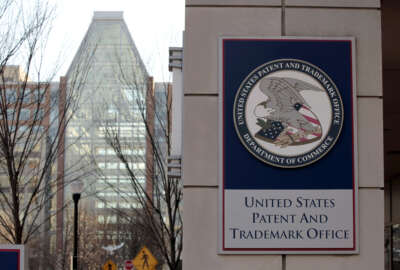

Citing the pandemic, the Biden administration pushed back the deadline for enforcement of REAL ID travel requirements to May 2023.
Best listening experience is on Chrome, Firefox or Safari. Subscribe to Federal Drive’s daily audio interviews on Apple Podcasts or PodcastOne.
Some time in the distant past, Congress imposed a mandate on states to issue driver’s licenses and other forms of identification tied to a stack of documents that would verify the IDs. One form of enforcement would be denial of boarding commercial aircraft unless the passenger could produce a REAL ID. The latest deadline for enforcement to start was to have been this October. Now the Biden administration has pushed it back to May of 2023, citing the pandemic. For reaction, the legislative director for homeland security and public safety at the National Governors Association, Mary Catherine Ott, joined Federal Drive with Tom Temin.
Interview transcript:
Tom Temin: Ms. Ott, good to have you on.
Mary Catherine Ott: Hey, Tom, thanks for having me, appreciate being here.
Tom Temin: So is it fair to say that the governors and the states are thrilled about this deadline push back, not quite to 20 years, but we’re getting there?
Mary Catherine Ott: Yeah, no, I think it definitely, especially in light of the pandemic is some breathing room to states and governors to execute these requirements of the act.
Tom Temin: Now, I spoke with the Ohio Registrar of Motor Vehicles a couple of months ago, just by coincidence, and he said that about 35% of drivers had a REAL ID but that had slipped somewhat, not because people gave them up, but because in the pandemic, more drivers came in, fewer people could get into registries or DMVS, whatever you call them in a given state, and so that the percentage went down. What’s your sense of what the national percentages – do even know?
Mary Catherine Ott: Well, I don’t have the specifics. And I know the Department of Homeland Security for at least the past year has been working with states and territories individually to get their percentage rate. So there’s a backend reporting to the department on that issue. But I would say from hearing from states, that is a huge concern and probably a trend across the states and territories of when you have DMV closures, when you have Department of Health closures where you might need to go to get your birth certificate requirement, it makes it a lot more difficult for individuals to go in and get their REAL ID.
Tom Temin: And in a given state, does most of this burden actually fall on the motor vehicle registries or are there other departments that are involved? Not everyone in the world has a driver’s license.
Mary Catherine Ott: Sure, yeah, I would say probably the DMV is for the most part, because the in person requirement means there’s nowhere else you can go to do this. So there’s probably some backend paperwork individuals have to do in order to get the right documentation they have to bring. Sometimes individuals come in with the intent of getting their REAL ID and show up and realize they don’t have a document. So that means you might have returned constituencies, which adds more to it. And then obviously, in a pandemic environment, either closures or smaller hours for individuals means less people can get processed on any given day.
Tom Temin: But is it only driver’s licenses that have to be REAL ID. Can there be another form of REAL ID that’s not a driver’s license?
Mary Catherine Ott: From a standpoint of REAL ID means that driver’s license so that context is specific to REAL ID. However, in the intent of either being to federal facilities, or getting on an airplane, which is probably going to impact individuals the most, passport suffices. And I think that’s one messaging point that if individuals have an active passport, that hey, wait a little longer, use your passport to get on the airplane. And I think you can also use your Global Entry ID as well as documentation to get on an airplane.
Tom Temin: Got it. So otherwise, it is the DMVs then that have been the main burden agency for all of this.
Mary Catherine Ott: Correct. And I haven’t looked into, Department of State and DHS might know this better, but I’m sure there’s been an uptick in passport applications as well, potentially, maybe not during the pandemic, but leading into this. And it’s possible, we might see more of that with people being eager to go travel if they’re vaccinated and kind of getting out of town.
Tom Temin: Well, I don’t know about passport issuance, but they certainly have a big backlog of built up from applications during the pandemic and the State Department is working that off right now too. We’re speaking with Mary Catherine Ott. She’s legislative director for homeland security and public safety issues at the National Governors Association. And so what will states do now that they have a much later deadline? Is that’s gonna make them lax because no deadline has been met yet in these many years since REAL ID was passed? What’s their strategy here?
Mary Catherine Ott: Sure. And every state’s probably going to address their challenges uniquely, that’s the great thing about states and territories, they have different approaches in terms of how they execute federal law. The one big issue here, the one big thing that’s going to help across the board is that the COVID package at the end of last year included what was called the REAL ID Modernization Act, which basically brought the REAL ID Act up into the 21st century. So if we think about in 2005 where technology was to 2021 and where technology is now, is there and are there ways to improve the execution of this act so individuals who might not have a social security card and now allows for other documentation with your social security number to be utilized when you show up at the DMV? Additionally, the Department of Homeland Security is implementing and doing proposed rulemaking to figure out is there technology for better kind of paperwork requirements and uploading paperwork, which if that happened, states have to then obviously purchase equipment or technology to actually execute that. So really, this extension allows for REAL ID modernization to happen. It gives us more time for states to both talk to the Department of Homeland Security to say, here are some techniques and approaches that we found that are successful to help individuals better be able to come into our DMVs and be able to get this. It also created the opportunity for the Department of Homeland Security to do a national campaign. So an education campaign. You think about REAL ID, well, an individual who’s not tracking this issue is going to say, I have a REAL ID, what does that mean? So now you have the opportunity too to educate people back in the states and territories to say, here are your requirements, here’s where you can go, here’s a link to your DMV in your state to understand what requirements you need and what documents you need to bring forward. And then probably critically most importantly, is that yes, after 16 years, there’s still going to be individuals who are either in rural areas or more remote areas who are either not aware of this requirement, or it’s a challenge to get to your DMV, or it’s a challenge to get your birth certificate, whatever requirements it might be. So you can tap into those constituencies a little bit more with more time. I know that Maryland last year had really implemented these mobile DMVs to get out to those rural and hard to reach individuals. So hopefully, we’ll see a little bit more of that. So all in all, it’s kind of better technology, better implementation, and then better outreach.
Tom Temin: And you mentioned a lot of paperwork that’s needed. And so they would have to scan this stuff and make it into a digital file and upload it. And there’s many shapes and types of documents, so you can’t just stick it in the regular scanner. And that gets to be complicated physically. Long term, is there any thought coming from any of the states or from DHS for doing this whole thing electronically, so that you could have the equivalent of a derived credential, say on a smart device that would, maybe a barcode or some kind of a thing, that the passenger manifest would have the database of people that are supposed to get on that plane so you don’t query the whole country every time someone gets on a plane. But then your smartphone would be the REAL ID.
Mary Catherine Ott: Sure. And I think that REAL ID Modernization Act allows the Department of Homeland Security to explore that opportunity. So usually through rulemaking is probably where we would see that and look into modernizing that identity vetting system. So right now, again, the way that the department interpreted the law from 2005 through a 2007 regulation was that you had to be physically present. But some people might say, well, do you really need to do that? So now it’s an opportunity to explore those technologies to find a way maybe to do more online work for it. And then additionally, it allows the department to look and explore the whole mobile driver’s license, you might see some states are moving to that right now. So that gets to your point, in terms of if you have a smartphone or some sort of electronic device that would allow you to have that mobile driver’s license. The act also allowed for the department to explore those options.
Tom Temin: Of course, I guess, if you can lose a wallet, you can lose a phone too, so you’re right back where you started. But basically, this push back to May of 2023, then is seen as good by your constituents.
Mary Catherine Ott: Absolutely. And I will fully admit we were prepared and starting the whole process as to whether or not states needed to make that ask again. So kind of preempted our need to actually formally ask for another extension. But I think we all recognize the pandemic was a very unique circumstance when, as we mentioned already, if people can’t get into their DMV, they’re not going to be able to get their REAL ID
Tom Temin: Saved by the virus. Mary Catherine Ott is legislative director for homeland security and public safety at the National Governors Association. Thanks so much for joining me.
Mary Catherine Ott: Great, thank you so much.
Copyright © 2025 Federal News Network. All rights reserved. This website is not intended for users located within the European Economic Area.
Tom Temin is host of the Federal Drive and has been providing insight on federal technology and management issues for more than 30 years.
Follow @tteminWFED


